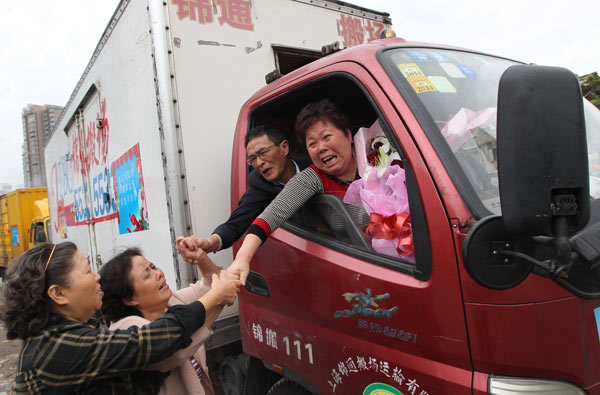Relocated farmers face uphill battle
Updated: 2013-10-29 23:39
By He Dan in Beijing and Zhao Kai in Guiyang
|
||||||||
 |
|
Liang Xianghua and his wife bid farewell to their neighbors on Oct 19 after moving out of their 20-square-meter home in the Hongkou district of Shanghai to make way for the demolition of the city’s largest shantytown in the downtown area. A recent nationwide survey by Tsinghua University found that 16 percent of Chinese households have had their homes demolished or land requisitioned during the nation’s urbanization drive.[Pei Xin / Xinhua] |
In a report on urbanization and movement of labor released by the China Data Center of Tsinghua University, 16 percent of some 12,500 people polled nationwide said they had their land seized or homes demolished. Researchers extrapolated from that data that some 64.3 million households on the Chinese mainland have gone through the process.
Of those whose land was seized, less than 80 percent said they received compensation and only 4 percent said they were given help finding a job, the report said.
One in 10 people who took part in the study said they had access to social insurance in cities where they were relocated.
Of the people who said their homes had been demolished, 94 percent received compensation, while less than 2 percent received support in finding a job and 21 percent were covered by urban social insurance, the report said.
Xia Jianping, 46, moved from his village in Guizhou province's Xiuwen county in July with his 71-year-old father, three siblings aged 38 to 50 and their children.
The county government gave them a 300,000 yuan ($49,290) subsidy and two 150-square-meter apartments for their half hectare of farmland and 250-sq-meter house, he said.
Xia now runs a grocery store that he bought from the local government for 32,000 yuan, and his siblings either work at the store or on construction sites.
"In the past, our family could earn 90,000 yuan a year selling grain and vegetables, and the income was very stable," he said. "Now the business in our grocery store varies, and we don't have the skills to find well-paid jobs.
"We were farmers living a simple life, but now we have to adjust to a new lifestyle in the city that makes me feel uneasy."
Li Qiang, director of the China Data Center, said inappropriate resettlement of farmers who lose their land remains a thorny social problem.
"Many local governments ignore the fact that land acquisition has a huge impact on farmers' long-term livelihood, especially middle-aged people who have no other skills apart from farming," he said.
Most people from rural areas who have moved to cities have taken low-income jobs and face a high risk of unemployment, he said.
Yang Zaiming, a lawyer who specializes in demolition lawsuits at Beijing Shengting Law Firm, said many local governments tend to underestimate the value of land requisitioned from farmers.
Farmers sometimes must pay extra money to get an apartment of a similar size in cities after governments take away their houses and land.
"Without land, a house and the coverage of social insurance, many farmers are struggling," he said. "The cost of living is also much higher in cities."
Forced demolitions lead to increasing social unrest, petitions, protests and in some extreme cases to people setting themselves on fire to express their anger, he added.
He urged laws on land management be amended and enforcement strengthened to make the process of urbanization fairer for disadvantaged groups.
Qi Xin in Zhengzhou contributed to this story.
 Hot air balloons loom high on tourist horizon
Hot air balloons loom high on tourist horizon
 Ellis Island reopens for 1st time since Sandy
Ellis Island reopens for 1st time since Sandy ABC apologizes for 'Kimmel' joke
ABC apologizes for 'Kimmel' joke Lang Lang named UN Messenger of Peace
Lang Lang named UN Messenger of Peace
 Snowfall hits many areas of Tibet
Snowfall hits many areas of Tibet  Antiquated ideas source of Abe strategy
Antiquated ideas source of Abe strategy
 Storm wrecks havoc in S Britain, leaving 4 dead
Storm wrecks havoc in S Britain, leaving 4 dead
 Women's congress aims to close income gap, lift status
Women's congress aims to close income gap, lift status
Most Viewed
Editor's Picks

|

|

|

|

|

|
Today's Top News
US spying prompts reversal by anti-terror lawmaker
Hawaii debates over gay marriage legalization
Kerry urges Iran to show nuke program peaceful
Albright counsels fact not myth in relations
Is Obama's lack of transparency really his fault?
San Diego Symphony debuts at Carnegie
Lang Lang takes on UN `Messenger of Peace’ role
Fonterra botulism scare laid bare in board inquiry
US Weekly

|

|







